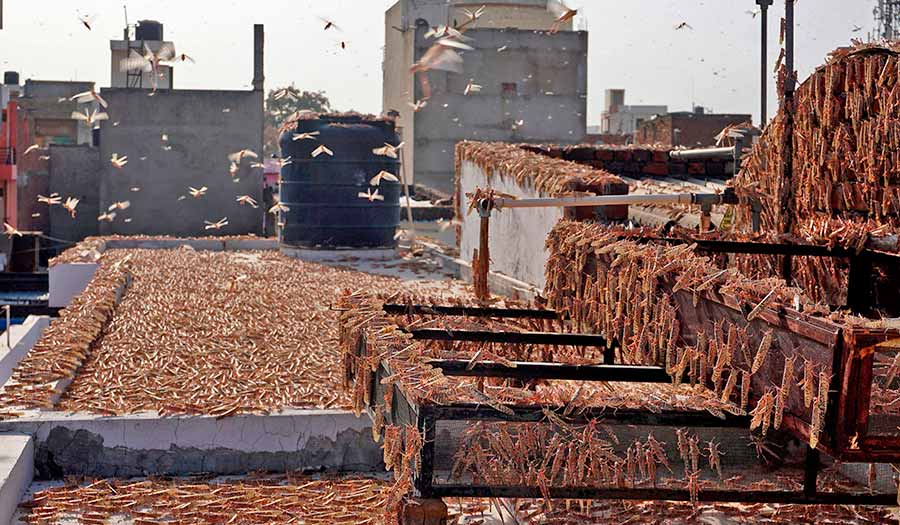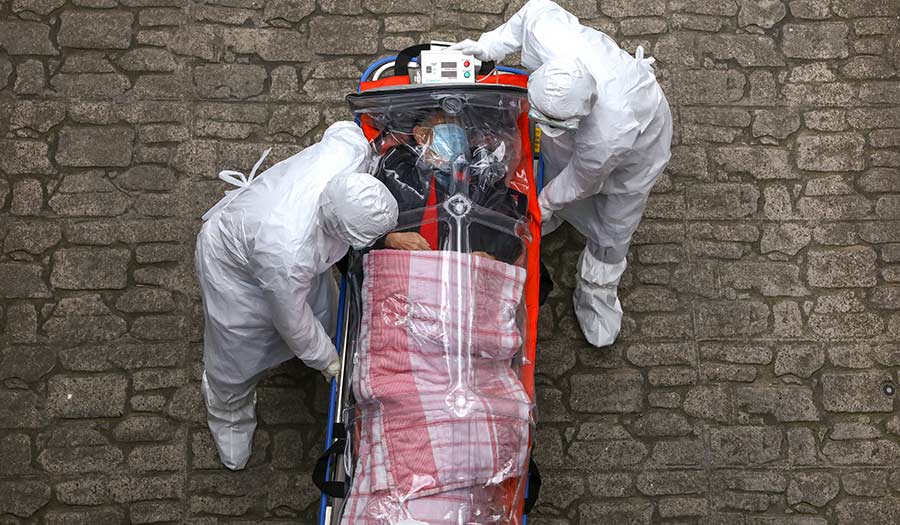 Vishal Bhatnagar/AFP via Getty Images
Vishal Bhatnagar/AFP via Getty Images
World News Desk
Learn the why behind the headlines.
Subscribe to the Real Truth for FREE news and analysis.
Subscribe NowNEW DELHI (AP) – As if the coronavirus was not enough, India grappled with scorching temperatures and the worst locust invasion in decades. This all came as authorities prepared for the end of a months-long lockdown despite recording thousands of new infections every day.
The triple disaster drew biblical comparisons and forced officials to try to balance the competing demands of simultaneous public health crises: protection from eviscerating heat but also social distancing in newly reopened parks and markets.
The heat wave threatens to compound challenges of containing the virus, which has started spreading more quickly and broadly since the government began easing restrictions of one of the world’s most stringent lockdowns earlier this month.
“The world will not get a chance to breathe anymore. The ferocity of crises are increasing, and they’re not going to be spaced out,” said Sunita Narain of New Delhi’s Center for Science and Environment.
When her 6-year-old son woke up with a parched throat and a fever, housekeeper Kalista Ekka wanted to bring him to the hospital. But facing a deluge of COVID-19 patients, the doctor advised Ms. Ekka to keep him at home despite boiling temperatures in the family’s two-room apartment in a low-income neighborhood in South Delhi.
“The fan only makes it hotter but we can’t open the window because it has no screen,” and thus no defense against malaria and dengue-carrying mosquitoes, Ms. Ekka said.
In a nearby upmarket enclave crowded with walkers and joggers every morning and evening, neighbors debated the merits of masks in an online forum.
In the heat, “it is very dangerous to work out with a mask. So a Catch-22 situation,” said Asmita Singh.
Temperatures soared to 118 degrees Fahrenheit in the capital New Delhi this week, marking the warmest May day in 18 years, and 122 degrees in the desert state of Rajasthan, after the world’s hottest April on record.
India suffers from severe water shortages and tens of millions lack running water and air conditioning, leaving many to seek relief under shady trees in public parks and stepwells, the ancient structures used to harvest rainwater.
Cyclone Amphan, a massive super storm that crossed the unusually warm Bay of Bengal last week, sucked up huge amounts of moisture, leaving dry, hot winds to form a heat wave over parts of central and northern India.
At the same time, swarms of desert locusts have devastated crops in India’s heartland, threatening an already vulnerable region that is struggling with the economic cost of the lockdown.
Exasperated farmers have been banging plates, whistling or throwing stones to try to drive the locusts away, and sometimes even lighting fires to smoke them out. The swarms appeared poised to head from Rajasthan north to Delhi, but on Wednesday a change in wind direction sent them southward toward the state of Madhya Pradesh instead.
K.L. Gurjar, a top official of India’s Locust Warning Organization, said his 50-person team was scrambling to stop the swarms before breeding can take place during India’s monsoons, which begin in July. Otherwise, he said, the locusts could destroy India’s summer crops.
Meanwhile, India reported another record single-day jump of more than 6,500 coronavirus cases on Thursday, pushing up the total to 158,333 confirmed cases and 4,531 deaths.
Prime Minister Narendra Modi’s government is preparing a new set of guidelines to be issued this weekend, possibly extending the lockdown in worst-hit areas while promoting economic activity elsewhere, with unemployment surging to 25 percent.
The sudden halt to the Indian economy when the lockdown began March 25 has been devastating for daily laborers and migrant workers, who fled cities on foot for their family homes in the countryside.
The government started running special trains for the migrants, but deaths on the rails because of starvation or dehydration have been reported. Others immediately put into quarantine centers upon their arrival in home districts have tested positive for COVID-19, adding to the burden of severely strained rural health systems.
Sunita Narain of New Delhi’s Center for Science and Environment said government initiatives that expand federal agriculture employment, cash transfer and food ration programs will help India deal more effectively with its threats.
“It’s building coping abilities of the very poor to be able to deal with stress after stress after stress,” she said.
- Personals
- ANALYSIS
 “And There Shall Be Pestilences…”
“And There Shall Be Pestilences…”
Other Related Items:
- Emerging Disease Epidemics – From Pests to Pestilence
- Making Sense of COVID-19
- Tomorrow’s Wonderful World – An Inside View!


